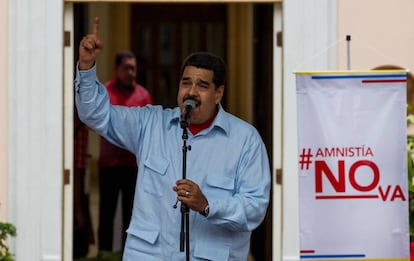Venezuelan Supreme Court strikes down amnesty law
Maduro administration wins latest in series of battles against opposition-led National Assembly

In a widely expected decision, Venezuela’s Supreme Court has struck down an Amnesty and Reconciliation Law two weeks after the country’s opposition-controlled parliament passed the bill. President Nicolás Maduro had used his powers to swiftly appeal to the highest court in the land to block the release from jail of 78 political prisoners, among them senior opposition figures Leopoldo López and Antonio Ledezma, despite international criticism from human rights groups.
The Constitutional Court, stacked with supporters of Maduro’s predecessor, Hugo Chávez, is now, to all intents and purposes, a government tool to block the opposition. The court’s justices ruled that there are no provisions under Venezuelan law for amnesty, and that the proposed measure would engender “scandalous impunity” and that “the National Assembly cannot declare a stay of proceedings in cases of crimes against humanity,” in clear reference to the deaths that took place during the protests organized by López, Ledezma and former Congresswoman María Corina Machado.
Venezuelan politics now seems reduced to a stalemate between government and opposition
The opposition suffered another blow last week. The National Electoral Council, which is also controlled by government supporters, rejected a petition for recall referendum filed by the opposition umbrella group, the Democratic Unity Roundtable (MUD). A recall referendum is a procedure by which voters can remove an elected official from office through a direct vote before his or her term has ended. The Council said the petition was improperly filed and failed to comply with election laws.
Venezuelan politics now seems reduced to a stalemate in which the opposition passes laws in parliament and the executive branch blocks anything that undermines its political power.
In the meantime, Maduro is nearing his midterm. In January, National Assembly President Henry Ramos Allup promised that lawmakers would find the legal means to call for early elections within the first semester of the year.
English version by Dyane Jean François.
Sign up for our newsletter!
EL PAÍS English Edition is launching a weekly newsletter. Sign up today to receive a selection of our best stories in your inbox every Saturday morning. For full details about how to subscribe, click here.
Tu suscripción se está usando en otro dispositivo
¿Quieres añadir otro usuario a tu suscripción?
Si continúas leyendo en este dispositivo, no se podrá leer en el otro.
FlechaTu suscripción se está usando en otro dispositivo y solo puedes acceder a EL PAÍS desde un dispositivo a la vez.
Si quieres compartir tu cuenta, cambia tu suscripción a la modalidad Premium, así podrás añadir otro usuario. Cada uno accederá con su propia cuenta de email, lo que os permitirá personalizar vuestra experiencia en EL PAÍS.
¿Tienes una suscripción de empresa? Accede aquí para contratar más cuentas.
En el caso de no saber quién está usando tu cuenta, te recomendamos cambiar tu contraseña aquí.
Si decides continuar compartiendo tu cuenta, este mensaje se mostrará en tu dispositivo y en el de la otra persona que está usando tu cuenta de forma indefinida, afectando a tu experiencia de lectura. Puedes consultar aquí los términos y condiciones de la suscripción digital.








































